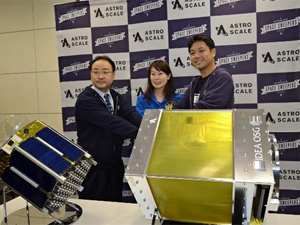



Date:24/04/17
 An innovative cleaning system that uses an adhesive compound to collect debris in space will debut in the first half of 2019, Singapore-based company Astroscale says.
An innovative cleaning system that uses an adhesive compound to collect debris in space will debut in the first half of 2019, Singapore-based company Astroscale says.
The company is expected to launch its first trial mission, expected to last between six months to a year, to demonstrate its key technologies for future missions, and intends to set up a cleaning service by 2020, said a spokesperson of the company's development and production centre in Tokyo.
The system, brainchild of Nobu Okada, a Japanese entrepreneur and founder of Astroscale, comprises a satellite called the "mother" unit with six "child" units to collect the debris with the help of a special adhesive.
Once a reasonable amount of debris has magnetically attached itself to the devices, the "child" units will enter the earth's atmosphere and combust together.
The company said on Thursday the aim is to establish a clean-up system for space agencies and private operators to effectively remove debris of defunct satellites from space in the future.
There are more than 750,000 pieces of debris, each measuring at least one centimetre, in space, European Space Agency director-general Jan Worner said on Tuesday during the opening day of the seventh space debris conference that is being held until April 21 at its Darmstadt centre in Germany.
These pieces pose a serious threat as even a very small piece can severely damage an operational satellite and produce chain collisions, which may make mobile networks, television or meteorological forecasts non-functional.
The main space organisations, including the ESA and NASA, have not yet developed a proven technology to deal with the problem, prompting Okada to set up Astroscale four years ago.
Astroscale preps space debris sweeper for 2019 test
 An innovative cleaning system that uses an adhesive compound to collect debris in space will debut in the first half of 2019, Singapore-based company Astroscale says.
An innovative cleaning system that uses an adhesive compound to collect debris in space will debut in the first half of 2019, Singapore-based company Astroscale says.The company is expected to launch its first trial mission, expected to last between six months to a year, to demonstrate its key technologies for future missions, and intends to set up a cleaning service by 2020, said a spokesperson of the company's development and production centre in Tokyo.
The system, brainchild of Nobu Okada, a Japanese entrepreneur and founder of Astroscale, comprises a satellite called the "mother" unit with six "child" units to collect the debris with the help of a special adhesive.
Once a reasonable amount of debris has magnetically attached itself to the devices, the "child" units will enter the earth's atmosphere and combust together.
The company said on Thursday the aim is to establish a clean-up system for space agencies and private operators to effectively remove debris of defunct satellites from space in the future.
There are more than 750,000 pieces of debris, each measuring at least one centimetre, in space, European Space Agency director-general Jan Worner said on Tuesday during the opening day of the seventh space debris conference that is being held until April 21 at its Darmstadt centre in Germany.
These pieces pose a serious threat as even a very small piece can severely damage an operational satellite and produce chain collisions, which may make mobile networks, television or meteorological forecasts non-functional.
The main space organisations, including the ESA and NASA, have not yet developed a proven technology to deal with the problem, prompting Okada to set up Astroscale four years ago.
Views: 385
©ictnews.az. All rights reserved.Similar news
- Azerbaijani project to monitor disease via mobile phones
- Innovative educational system to be improved under presidential decree
- NTRC prolongs license of two TV and radio organizations for 6 years
- Azerbaijan establishes e-registry for medicines
- Azerbaijani museum introduces e-guide
- Nar Mobile opens “Nar Dunyasi” sales and service center in Siyazan city
- International conference on custom electronic services held in Baku
- OIC secretary general to attend COMSTECH meeting in Baku
- Azerbaijan develops earthquake warning system
- New law to regulate transition to digital broadcasting in Azerbaijan
- Azerbaijani State Social Protection Fund introduces electronic digital signature
- Intellectual traffic management system in Baku to be commissioned in December
- Tax Ministry of Azerbaijan started receiving video-addresses
- World Bank recommends Azerbaijan to speed up e-service introduction in real estate
- Azerbaijan to shift to electronic registration of real estate





















